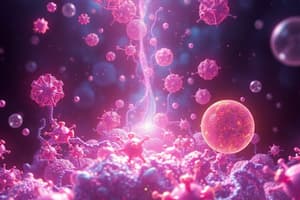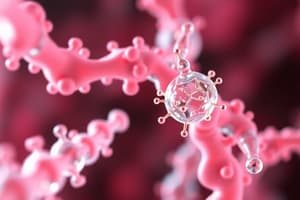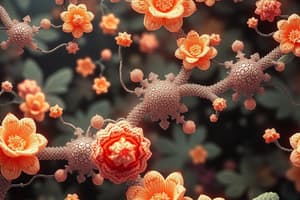Podcast
Questions and Answers
What are the four important classes of organic compounds?
What are the four important classes of organic compounds?
Lipids, carbohydrates, proteins, nucleic acids
Explain the significance of water in living systems.
Explain the significance of water in living systems.
Water is the most abundant substance in living systems, providing a medium for chemical reactions, transport within cells, and influencing cellular components' structure and properties.
What are the two important features observed in biological reactions related to water?
What are the two important features observed in biological reactions related to water?
Polarity and ionization ability
Explain the role of minerals in cell metabolism.
Explain the role of minerals in cell metabolism.
Signup and view all the answers
Why are lipids known as hydrophobic?
Why are lipids known as hydrophobic?
Signup and view all the answers
What is the influence of water on non-covalent interactions in biomolecules?
What is the influence of water on non-covalent interactions in biomolecules?
Signup and view all the answers
What are biomolecules and why are they essential for living organisms?
What are biomolecules and why are they essential for living organisms?
Signup and view all the answers
How are biomolecules classified based on their composition?
How are biomolecules classified based on their composition?
Signup and view all the answers
What are micromolecules and macromolecules in the context of biomolecules?
What are micromolecules and macromolecules in the context of biomolecules?
Signup and view all the answers
Explain the role of biomolecules in maintaining the living state of cells.
Explain the role of biomolecules in maintaining the living state of cells.
Signup and view all the answers
What are the unique properties of carbon that make it essential for biomolecules?
What are the unique properties of carbon that make it essential for biomolecules?
Signup and view all the answers
How do biomolecules play a role in the evolution of living organisms?
How do biomolecules play a role in the evolution of living organisms?
Signup and view all the answers




